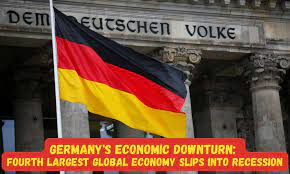Germany’s chamber of commerce warns of heaviest slump in 20 years.
Germany’s DIHK chambers of industry and commerce warned on Thursday that Europe’s biggest economy will shrink by 0.5% this year, in a second year of recession and its worst downturn in two decades.
A DIHK poll of more than 27,000 companies showed that of those surveyed, 35% expect business to deteriorate in the next 12 months with only 14% expecting an improvement, as high energy prices, bureaucracy, a skilled workers shortage and weak domestic demand weigh on economic output.
The bad mood among companies is becoming more entrenched,” said the DIHK in Berlin on Thursday, adding that it would be only the second time in Germany’s post-war history where the economy contracted for two years in row.
The first case was in 2002 and 2003 when two consecutive recessions pushed the Social Democrats-Greens government of the time to introduce aggressive labour market and welfare reforms that were credited with elevating Germany to an internationally envied level of competitiveness.
Chancellor Olaf Scholz blamed the sluggish global economy for Germany’s weak economic performance, adding that Germany was still an attractive location for new large-scale projects following the recent announcement of new batteries, chips, cars and pharmaceuticals plants that will be built in Germany.
The European Commission on Thursday said Germany will be the biggest drag on euro zone growth this year and next, with growth of only 0.3% in 2024 rather than 0.8% expected in November and 1.2% in 2025, after a 0.3% recession last year.
The government next week will publish its economic growth forecast for this year. A source with knowledge of the matter said Berlin will slash its growth forecast to just 0.2%, although still a much more optimistic forecast than the DIHK’s.
DIHK’s Wansleben said legislation that obliges German companies to scrutinise human rights and environmental issues in supply chains globally must be suspended as it places an onerous burden on larger companies.
A sharp rise in interest rates to fight inflation following Russia’s invasion of Ukraine had also slowed the economy, he said.
